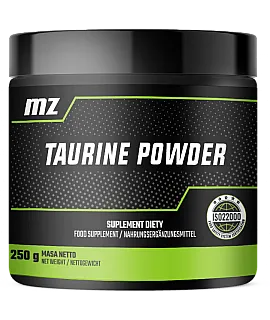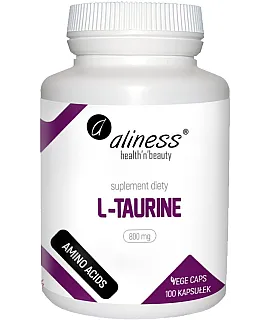Taurine



Taurine is a sulfur amino acid that occurs naturally in the human body, mainly in skeletal muscle, heart muscle, brain and retina. It is also supplied in certain amounts from the diet. This important compound performs a number of important functions in the body, including participating in the regulation of calcium ions in cells, assisting in the production of bile acids and playing a key role in the proper functioning of the nervous system. Taurine is also found in breast milk and animal products such as meat, fish and shellfish.Read more
What is taurine and what is its importance for health?
Taurine is an organic chemical compound classified as a sulfur amino acid. Although it is not used to form peptide bonds in proteins, it has many important functions in the body. Taurine naturally occurs in animal tissues, mainly in skeletal muscle, heart muscle, brain and retina. The highest amount can be found in foods of animal origin, such as meat, fish, shellfish, as well as in some species of seaweed and kelp.
Taurine is involved in regulating the level of calcium ions in cells, which is important for the proper functioning of muscles, including the heart muscle. In addition, this amino acid supports the production of bile acids, which are necessary for the digestion of fats, and plays a key role in the proper functioning of the nervous system. Taurine also exhibits antioxidant activity, protecting cells from oxidative stress.
The concentration of taurine in the body can fluctuate depending on age, diet and health. People on a diet low in animal products, such as vegetarians and vegans, may have lower taurine levels. In such a situation, it is worth considering taurine supplementation to ensure that the body has an adequate amount of this important amino acid.
Taurine supplementation - for whom and in what doses?
Taurine supplementation can be especially recommended for physically and mentally active people, athletes, as well as vegetarians and vegans.
Dosage of taurine depends on individual needs and health status. Typically, 500 to 2,000 mg of taurine per day is recommended, preferably divided into 2-3 servings. Before starting supplementation, it is a good idea to consult a doctor or nutritionist to determine the appropriate dose and duration of supplementation.
Dietary supplements containing taurine are available in various forms, such as capsules, tablets or powder. It is advisable to choose high-quality products from reputable manufacturers that adhere to the highest European manufacturing standards, such as GMP and HACCP.
Taurine in the diet - natural sources of the amino acid
Taurine naturally occurs in animal products such as meat, fish and shellfish. The highest amount can be found in the skeletal muscles of mammals, as well as in some species of seaweed and kelp. Taurine is also found in breast milk, underscoring its importance for the proper development of infants.
People who follow a diet rich in animal products usually provide their bodies with sufficient taurine. However, vegetarians, vegans and those who limit their consumption of meat and fish may be at risk of deficiencies of this amino acid. In such a situation, it is worth considering taurine supplementation or enriching the diet with products containing this compound, such as seaweed or kelp.
It is worth remembering that taurine is also an ingredient in some energy drinks and sports nutrition supplements. However, consuming large amounts of these products is not recommended due to their high content of sugar, caffeine and other stimulants. A better option is a balanced diet and possible taurine supplementation in capsule or tablet form.
Effects of taurine on the human body
Taurine has many important functions in the human body. First of all, it is involved in regulating the level of calcium ions in cells, which is important for the proper functioning of muscles, including the heart muscle. Taurine also assists in the production of bile acids, which are necessary for the digestion of fats, and plays a role in the proper functioning of the nervous system. In addition, taurine exhibits antioxidant activity, protecting cells from oxidative stress.
Contraindications and precautions
Taurine is considered a safe dietary ingredient, and its consumption in recommended doses is not associated with the risk of serious side effects. Excess taurine is excreted from the body with urine, which further increases the safety of its use.
Nevertheless, it is advisable to consult a doctor or nutritionist before starting taurine supplementation, especially if you have a chronic illness or are taking medications. Pregnant and breastfeeding women should exercise caution and use taurine only after consulting a health care provider.
Dietary supplements containing taurine should be kept out of the reach of small children. Also, follow the recommended dosage and do not exceed the recommended serving to be taken per day. If you experience worrisome symptoms after taking taurine supplements, consult your doctor immediately.
The most important information about taurine is:
- Taurine is a sulfur amino acid that occurs naturally in the human body and performs many important functions.
- A dietary supplement containing taurine can be a valuable addition to the daily diet, especially for physically and mentally active people, athletes and vegetarians and vegans.
- Taurine is involved in regulating the level of calcium ions in cells, supports the production of bile acids and plays a role in the proper functioning of the nervous system.
- Natural sources of taurine are mainly animal products such as meat, fish and shellfish, as well as some species of seaweed and kelp.
- Taurine is considered a safe dietary ingredient, and its consumption in recommended doses is not associated with the risk of serious side effects.